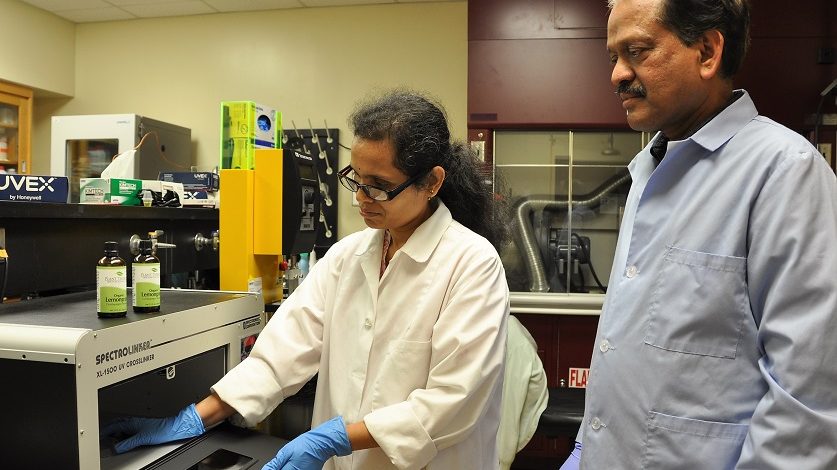Food Safety Breakthroughs Pioneered at FVSU Could Help Improve Health and Spur Economic Growth
September 18, 2018
Staff Report from Middle Georgia CEO

Tuesday, September 18th, 2018
The IFTNext Newsletter recently featured the groundbreaking work of Dr. Ajit Mahapatra and other FVSU researchers, including graduate assistant Hema Degala, who are working to find innovative ways to decontaminate the meat of ruminants. Ruminants are animals like cattle, goats, sheep, and deer who digest plant-based food through a common, multi-staged process involving the chewing of cud. Dr. Mahapatra and his colleagues developed an inexpensive way to use lemongrass oil and ultraviolent light to destroy E.coli and other pathogens. Many of the processes used to destroy bacteria today use thermal and chlorine-based washing techniques that harm the quality of the meat. The FVSU researchers have pioneered a non-thermal approach.
“Increasing intensity of UV-C [ultra-violent light] and concentration of LG [lemongrass oil] significantly increased bacterial reduction on goat meat,” Mahapatra told IFTNext.
“Researched and written weekly by the editorial team of Food Technology magazine, the IFTNext Newsletter explores what are, arguably, the next big things in the science of food through original reporting of scientific breakthroughs, leading-edge technology, novel food components, and transdisciplinary R&D,” according to the publication.
The work of the researchers could have a direct impact on food consumption, especially in helping to elevate the production of goat meat, which has become more popular in the United States because of the health implications of a lower fat than beef, pork, or lamb, and, as noted by the newsletter, “a growing immigrant population accustomed to its consumption.” The U.S. Department of Agriculture has found that the number of goats slaughtered has doubled every decade for approximately the past 30 years. According to the Washington Post, goat meat, “has a third fewer calories than beef, a quarter fewer than chicken and much less fat: up to two-thirds less than a similar portion of pork and lamb; less than half as much as chicken.” From 2007-2015, global goat meat consumption increased annually by 2.4%, according to IndexBox Marketing and Consulting.
Dr. Mahapatra brings a global perspective to his work, understanding that farming and food production techniques developed at FVSU can have international implications when used by small farmers around the world. His career includes instruction and research at the University of Botswana and the University of Zambia. He earned his Ph.D. from the Hungarian Academy of Sciences in Budapest, a master’s degree from the Indian Institute of Technology in Kharagpur, and a bachelor’s degree from the Orissa University of Agriculture and Technology in Bhubaneswar, India. In addition to ruminant food safety, the certified food scientist has conducted research on stevia powder, beef and pork safety, ethanol production, information gaps in farm-to-table studies, rice flours, and food processing, among other areas.
Mahapatra recommends more research be conducted to determine if the effect of his approach on goat meat’s taste, color, and odor. If successful, he suggests, it could help improve the food’s acceptance among a broader swath of consumers. The technique can be particularly helpful to farmers with more limited resources, Mahapatra told IFTNext, “and will not only be useful in red meat, but can also be optimized and applied to seafood, poultry products, and fresh produce.”
Click here for link to original article.









